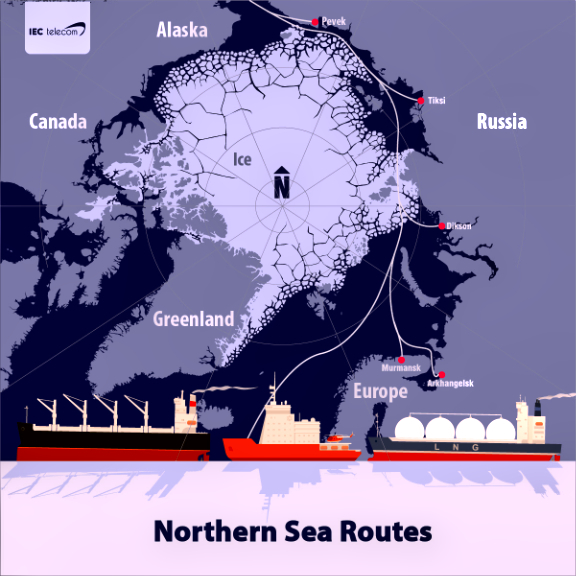As the shortest sea route between Europe and the Asia-Pacific region, the Northern Sea Route holds immense potential to compete with conventional trade lines.
With the Iridium Certus™ 700 service becoming commercially available at speeds of 700 kbps — the fastest L-band speed in the industry, according to the company — Iridium’s network with pole-to-pole coverage can further unlock new opportunities for the fleets operating in the North. Fishing fleets, commercial ships, and other vessels transiting Arctic waters can benefit from enhanced connectivity in these remote and potentially hazardous waters.

Many of IEC Telecom’s clients operating in the Northern Sea region have recently switched to the Iridium Certus service. Iridium Certus™ 700 will also be beneficial to the oil and gas sector, which has been expanding in the Arctic region.
With more than 40 billion barrels of oil produced over the past 40 years and 184 active rigs in 2018, the industry is increasingly focusing on innovative ways to reduce costs with sustainable practices. Satellite-based technologies are excellent drivers of operational efficiency with optimized navigation, decreased fuel consumption, and better crew welfare options.
Upgrading to Iridium Certus™ 700 requires no new hardware for existing users. Powered by a global constellation of 66 cross-linked, LEO satellites, the Iridium® network provides high-quality voice and data connections, enabling partner companies like IEC Telecom to deliver an innovative and rich portfolio of reliable solutions across the globe.
When Iridium completed its constellation upgrade in early 2019, the company replaced all of their satellites and upgraded the supporting ground infrastructure. This enabled the launch of Iridium Certus®, a multi-service platform that delivers specialty broadband services. At only 780 kilometres from the Earth, the proximity of Iridium’s LEO network means a shorter transmission path, stronger signals, lower latency, and shorter registration time than GEO satellites. Each Iridium satellite is linked with up to four others, creating a dynamic network that routes traffic among its satellites to ensure global coverage, even where traditional local systems are unavailable.
IEC Telecom’s strategic partnership with Iridium further strengthens its commitment to delivering connectivity services no matter where its customers are located. With Iridium Certus™ 700, it’s an exciting time to do business in the Arctic and Northern Sea Route.

Alf Stian Mauritz
Alf Stian Mauritz, Managing Director, IEC Telecom Norway, said vessels operating in this region require robust solutions that can be relied upon under harsh weather conditions. Iridium Certus is the only global network able to meet these requirements. With this new speed, northern operators can share greater levels of data with their shore offices, avail VOIP calls and access faster email exchange.
As an Iridium Master Distributor, IEC Telecom offers customers the expertise required to transition to this service and the firm also provides a completely compatible network management solution, OneGate. With IEC Telecom's technical support services, customers obtain better visibility over their remote satellite assets. Such solutions can help operators in the northern region to enhance their crew welfare options, access reliable cyber security and filtration and even customize cloud-based features.

